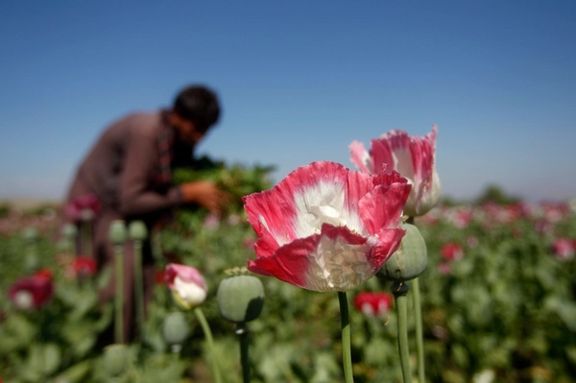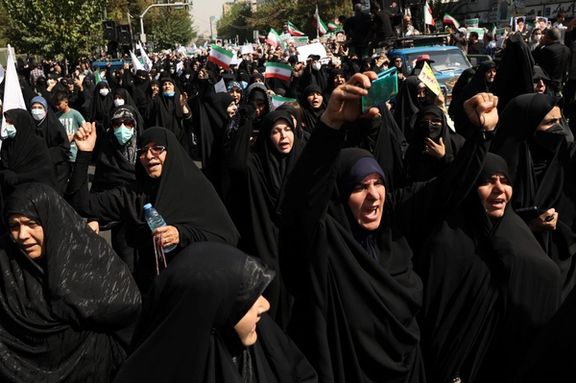Iran Rejects UN Claims That Afghanistan Poppy Cultivation In Decline

Iran has rejected the recent United Nations report that claims a 95% reduction in opium production in Afghanistan.

Iran has rejected the recent United Nations report that claims a 95% reduction in opium production in Afghanistan.
Amir Abbas Lotfi, the Director General of the International Relations Office of the Drug Control Headquarters in Iran, contradicted the UN findings, stating that not only did Afghanistan decrease opium production, but it also expanded the production of psychotropic substances despite the ban imposed by the Taliban.
Lotfi pointed to another UN report from last year, highlighting that the income of Afghan farmers had tripled suddenly, reaching over $4 billion.
"Traditional drug trafficking, such as opium and psychotropic substances, from Afghanistan to Iran is still occurring," he said.
Iran, often recognized as a significant global conduit for drug trafficking to European markets, is allegedly implicated in these activities, with accusations of involvement by the Islamic Revolutionary Guard Corps (IRGC). Reports from Western and regional intelligence agencies suggest that the Islamic Republic, along with its paramilitary partners, plays a notable role in drug trafficking networks operating in the Middle East and the West.
Investigations indicate a notable increase in the transfer of large narcotics shipments from Iran to Arab countries, Southeast Asia, and Europe. However, Iranian authorities place the blame on Western governments.







Amid burgeoning ties, Iran's deputy defense minister has announced the purchase of the advanced Sukhoi-35 fighter jet amongst its latest arms deal with Moscow.
Mehdi Farahi told IRGC-affiliated Tasnim news agency on Tuesday that Iran anticipates the delivery of the Mil Mi-28 attack helicopter, Sukhoi-35 fighter jet, and Yak-130 training aircraft imminently as the regime ramps up its supplies from the fellow sanctioned nation.
As of now, Russian authorities have not commented on the latest deal which gives it access to some of Russia's most sought-after technology. Moscow's invasion of Ukraine and its heightened need for weapons, particularly drones, has led to a deepening of ties between the two nations keen to ramp up their military capabilities in the face of global sanctions.
Iran's pursuit of the Russian Sukhoi-35 stems from its perception as a formidable rival to the American F-35. Given the aging fleet of fighter jets, many acquired during the reign of the Shah, the acquisition signals a potential modernization of Iran's air force.
Contradictory statements regarding the acquisition process have become a recurrent theme in Iran's discourse. In June, Air Force Commander Hamid Vahedi expressed the necessity for the Sukhoi-35 but remained uncertain about its deployment timeline.
A month later, the Defense Minister under President Ebrahim Raisi indirectly acknowledged disruptions in the fighter jet purchase contract. Mohammadreza Ashtiani, responding to queries about the Sukhoi-35 acquisition, hinted that the capability for domestic production played a role in the decision.
Speculation surrounding potential disruptions in military cooperation between Russia and Iran has surfaced, with some suggesting that Israel may have influenced Russia to postpone the delivery of the advanced fighter jets.
In an effort to bolster revenue, the Iranian government has identified 110,000 luxury homes to tax, cracking down on the country's affluent homeowners.
According to the annual tax law, properties exceeding 400,000 USD value face a two per thousand tax on the excess value, with municipalities mandated to report property status to the Tax Affairs Organization.
Notably, residential units and villas under construction are exempt from this tax, and in cases of ownership transfer, the luxury home tax responsibility falls on the original owner starting from the Iranian New Year on March 21.
The government claims the objective in taxing vacant luxury homes is to discourage owners, not dependent on them for income, from keeping these properties empty to demand rents or sale prices higher than market values.
However, the move has sparked criticism, with some attributing it to the government's financial constraints due to sanctions and low oil revenues. Critics argue that the government is resorting to extracting more money from citizens, as they face a large budget deficit.
The amount of the Iranian government debts has increased about 900-fold over the past decade to $60 billion. This would be as much as 850 million barrels, or two years’ worth of oil exports at normal market prices.
Iran's economy, where 80% is directly or indirectly controlled by the government or semi-official entities, has faced challenges despite a privatization drive initiated 15 years ago. The effort has, in some cases, resulted in the creation of quasi-governmental firms controlled by influential figures, limiting competition and relying on public funds to sustain operations.
Two Iranian tourism professionals have been arrested in Esfahan province for “violating hijab regulations.”
Niloufar Ghazaleh and her husband, Mohammad Ali Moghimi, were taken into custody on Monday under the orders of the judge of Khur and Biabanak county court.
Approximately a month ago, Ghazaleh had received a five-year imprisonment sentence for what authorities termed "publishing photos without hijab." The couple's guest house has been sealed for over a month under the same judge's directive.
Reports indicate that numerous tourist accommodations in the city of Khur, recognized as the Mesr Tourism Zone, have been shut down in recent months, ostensibly due to visitors not adhering to hijab.
Local witnesses suggest that, following the judge's order, law enforcement has closed down all previously thriving tourism-related businesses in the area.
Activities such as entering tourist sites without permission, conducting body inspections by undressing tourists, and scrutinizing the contents of tourists' mobile phones are among the measures carried out by the police in the region.
In September, Esmail Barat, Deputy for Supervision and Evaluation of Tourism Services in the country, revealed that, over the past year, 77 tourism units nationwide, including hotels, eco-lodges, traditional restaurants, and roadside centers, have been sealed due to "failure to observe norms and hijab."
Moreover, in July, disturbing images and news emerged of an attack by approximately 30 IRGC forces in uniforms and military vehicles on tourists residing in tents in the mountainous region of Opart, bordering Semnan and Mazandaran. The victims were reportedly subjected to beatings with batons and shockers.
A few days after the incident, the news website Rouydad 24 reported that the spokesperson for the Semnan governorate insisted that the Islamic Revolutionary Guard Corps should be held accountable for the assault.
Iran received many messages from the United States in the past six weeks of regional conflict, foreign minister Hossein Amir-Abdollahian told Qatar’s Al Jazeera television.
“Americans always emphasized in their messages that they are not after expanding the war. We responded that although you say you are not after expanding the war, but by standing with the Israeli regime and supplying large quantities of weapons and equipment from American bases in the region, you have practically expanded the conflict,” Amir-Abdollahian said. The messages were delivered through the Swiss embassy in Tehran, he said.
The United States deployed two powerful naval strike groups to the region soon after Israel began its attacks on Gaza, after Hamas’ terror attack on October 7. They deployment was seen as deterrence to Iran and its most powerful proxy force, the Lebanese Hezbollah.
Iran avoided direct military involvement in the Gaza war, but its proxy forces launched attacks against US bases in the region and against Israel.
Amir-Abdollahian referred to these attacks in his interview, as “the natural reaction of resistance forces in the region.” He then went on arguing that militant groups in Iraq, Lebanon and elsewhere in the region are genuine anti-US and anti-Israeli popular forces, failing to mention that Iran’s Revolutionary Guard spent vast sums of money to create these groups and support them.
Although the US retaliated several times against the more than 70 attacks on US forces in past weeks, critics argue that deterrence against Iran has failed and Washington needs to target the Revolutionary Guard directly to prevent more attacks.
On the International Day for the Elimination of Violence against Women, civil society groups emphasized that serious violations in Iran is deeply ingrained and systematic.
The Women's Revolution, a coalition of rights activists advocating for social and economic equality, modernism, and the separation of religion and state, highlighted the roots of women's rights violations in the laws and governance of the Islamic Republic.
These violations include granting men the right to divorce and child custody, obliging women to provide marital relations on demand, endorsing child marriage, imposing death sentences on women for extramarital relationships, idealizing traditional gender roles, restricting women's entry to stadiums, and imposing limitations on their education and professions.
“We, the signatories of this statement, know very well that women will never be freed from violence and this cycle of sexism will continue given the domination of a gender apartheid system. But we believe that the Woman, Life, Freedom revolution has sparked the hope in everyone's hearts that the end of this tragedy is conceivable,” the statement said.
In a statement which it published on Facebook, the banned Iranian Writers’ Association (Kanoon-e Nevisandegan-e Iran), also said violation of women’s rights in the Islamic Republic is “systematic”.

The Writers’ Association said in their statement that imposing hijab on Iranian women by the Islamic government after the 1979 revolution was a first step that was quickly followed to embrace many other areas of their lives including laws, family, work, and education. These, the statement said, revealed themselves in deepening of women’s oppression and revealed themselves as domestic violence, child marriage, and honor killings, and other forms of violence such as acid attacks.
“This misogyny revealed its ultimate barbarism against the movement that began with the Woman, Life, Freedom slogan,” the statement said and warned that the “dominance of reactionary cultural and religious elements” has elevated violence against women and their oppression to “disastrous new dimensions”.
Many allege that the Islamic Republic has given free rein to reactionary religious groups for violence against women such as mass poisoning of female students that began in November last year and continued for several months.
Authorities denied any responsibility or involvement in the attacks that affected hundreds of schools and thousands of girls across the country for months but did not take action to find and arrest those behind the attacks.
Authorities have also stepped-up pressure on women’s rights activists who are increasingly being arrested on various pretexts and heavily sentenced in unfair trials to silence them. Women’s rights activists are also increasingly being subjected to violence in prisons.
In a letter from Evin Prison in August, Narges Mohammadi who won the Nobel Peace Prize in November warned about escalating systematic violence against female prisoners and revealed disturbing details of physical harassment, abuse, and assault inflicted on women inmates in the months leading up to the anniversary of the nationwide Woman, Life, Freedom protests.
In a resolution adopted Thursday, the European Parliament strongly condemned the latest attacks against women, girls, and women's rights defenders in Iran and called on the Iranian leadership to immediately stop the systemic oppression and all discrimination against women and girls, including mandatory veiling, and to withdraw all gender discriminatory laws.